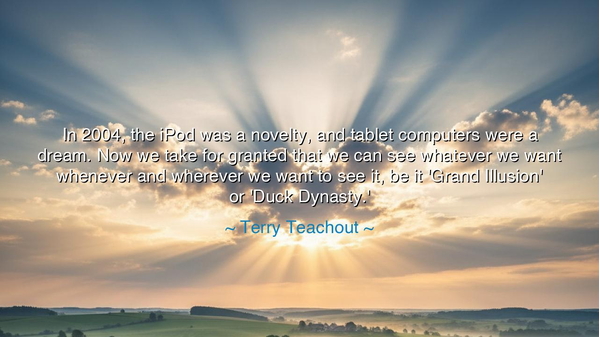
In 2004, the iPod was a novelty, and tablet computers were a
In 2004, the iPod was a novelty, and tablet computers were a dream. Now we take for granted that we can see whatever we want whenever and wherever we want to see it, be it 'Grand Illusion' or 'Duck Dynasty.'






"In 2004, the iPod was a novelty, and tablet computers were a dream. Now we take for granted that we can see whatever we want whenever and wherever we want to see it, be it 'Grand Illusion' or 'Duck Dynasty.'" These words, spoken by the wise Terry Teachout, remind us of the ever-changing tides of human progress. They are not just a reflection of technology’s rapid ascent, but of the way the very fabric of our lives has been woven into the threads of instant access. The phrase brings forth a world where the possibilities of technology are no longer dreams but assumptions—where once-imagined marvels have become mere background noise to our daily routines.
Let us travel back, as Teachout beckons us, to a time when the iPod was nothing more than a dream—a vision of a future where music was no longer confined to radios or CDs. In 2004, the iPod was a revolutionary device, freeing the listener from the chains of static radio stations, allowing music to become an experience of personal liberation. Yet, as ancient sages would have understood, progress is a cycle: what was once a new horizon becomes, over time, the ground beneath our feet. And so, what was novel in 2004 is now taken for granted, just as the discovery of fire or the invention of the wheel were once revolutionary, but are now the invisible forces that shape our lives.
The same is true for the tablet computers that Teachout mentions. At one point, these were fantastical devices that only existed in the imaginings of a few forward-thinking visionaries. The idea of carrying a device capable of connecting us to the world, transmitting knowledge, and entertaining us in the palm of our hands was once a far-flung dream. And yet, how quickly this dream was realized! Just as the ancient dreamers once gazed at the heavens, wondering how the stars could guide them, we, too, gaze upon our tablets, believing that with a swipe of our fingers, we can reach the farthest corners of the earth and witness the most distant stars.
However, the most profound aspect of Teachout’s quote is not merely the rapid rise of technology but how completely it has embedded itself into the very structure of our existence. We no longer marvel at these advancements as they come; instead, we assume them as part of the tapestry of modern life. Instant access has become not only a convenience but a necessity, as natural as the air we breathe or the earth beneath our feet. And with this change comes a powerful shift in how we engage with the world. What was once a time of wonder and exploration is now a time of expectation and complacency. The dream has been realized, and now we take it for granted.
It was not always so. There was a time when the ability to see anything, anywhere, was the stuff of legends. The Greek mythologies speak of gods who could transcend time and space with a simple gesture, and ancient seers foretold of a future where knowledge and experience would be boundless. But these dreams, like all visions, took time to manifest. Television, once the very tool that connected us to distant lands, now seems archaic, overshadowed by the more immediate and personalized experiences we now command. A time once imagined as a distant future is now our present.
Consider the ancient storytellers who traveled from village to village, sharing tales that shaped the culture of their people. They too had the power to capture the imagination and attention of their audience, just as today’s entertainment does. But back then, the story was the medium, the only means by which we could connect to the world beyond. Today, we have digital mediums that offer us not just stories but experiences. And yet, as with the storytellers of old, we must remember: it is not the medium that defines us, but the message it carries.
Thus, the lesson we are called to learn is this: Technology will continue to evolve, as it always has, reshaping the very world we inhabit. Yet, we must guard against the creeping apathy that comes with convenience. In our quest for instant access, let us not lose sight of the deeper truths—the wisdom of reflection, the value of patience, and the power of human connection. The iPod, the tablet, the screens—they are tools, but they are not the essence of our being. Let us embrace the tools, yes, but let us not forget that it is the human spirit, the creativity, the ability to dream, that defines us. Technology may show us the world, but it is we who must decide what we do with it.






AAdministratorAdministrator
Welcome, honored guests. Please leave a comment, we will respond soon